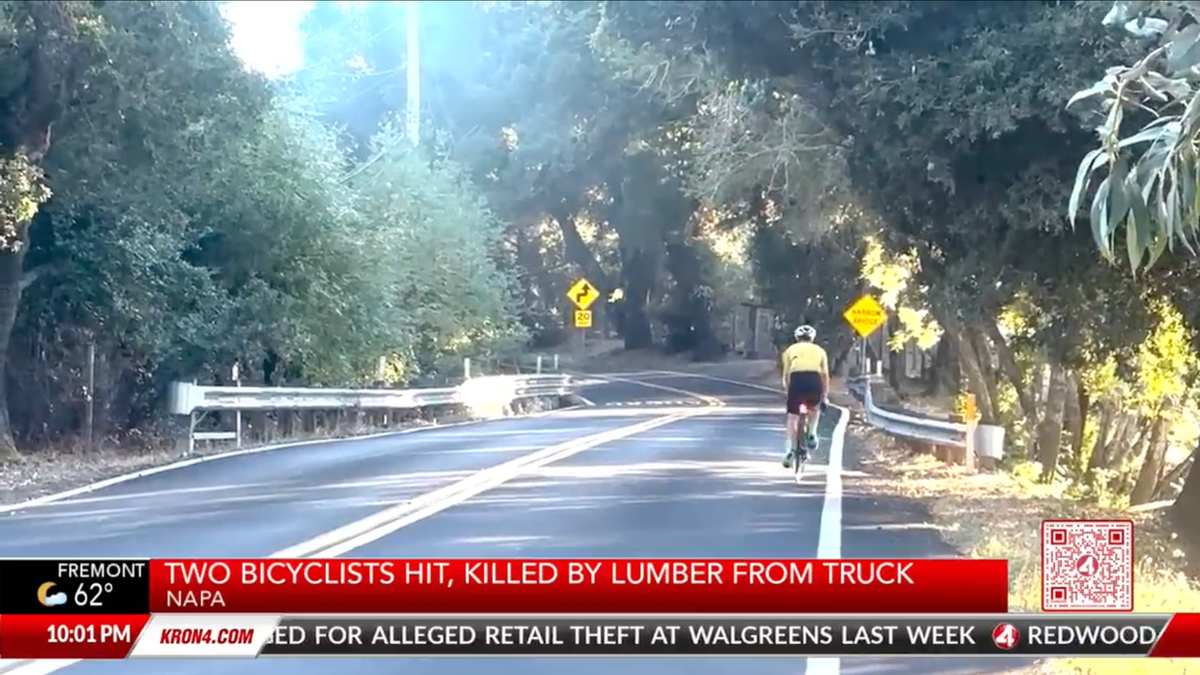Two cyclists died near Napa, California, Tuesday by a lumber truck when its load suddenly shifted of the picturesque roadway.
Authorities say the victims, identified as Christian and Michelle Deaton, were legally riding north on the valley’s winding, two-lane Silverado Trail when they encountered a flatbed truck headed in the opposite direction. Somehow, the lumber it was carrying shifted and fell, hitting the cyclists, Fox 8 reports.
Exactly what caused the load to hit the Deatons when it did is still being investigated, but Christian was declared dead at the scene. Michelle, meanwhile, was taken to a nearby hospital where she later died from her injuries. According to the sheriff’s office, they were visiting the Napa Valley from Portland, Oregon. And to his credit, the truck driver stayed at the scene and reportedly cooperated with authorities who are still investigating what caused the load to shift and hit the cyclists.
read more: https://jalopnik.com/two-cyclists-killed-by-trucks-lumber-load-in-california-1850954500
archive link: https://archive.ph/ZJb0f
Just a sad freak accident here. Put away your {fuck cars, fuck cyclists} pitchforks.
I mean… I get a lot of the arguments from the fuck cars people? But like… Do they really think we shouldn’t be transporting lumber anymore? No more wood?
Exactly, fuck cars isn’t “fuck transportation vehicles”. The things clogging the streets are personal vehicles, not buses and semi trucks (did I do American English correct here?) transporting stuff.
Which invalidates one of the key arguments of the “fuck cars” crowd. They regularly come with the argument that a road without cars would need way less maintanence and therefor would be cheaper. They ignore (or don’t know) that the damage done to roads by a vehicle depends on the weight and is an x^4 relationship. Guess what, if you banned all personal cars from a city while retaining access for trucks (as no city would survive without them), the road damage would not be reduced in any noticable manner.
Guess what, if you banned all personal cars from a city while retaining access for trucks (as no city would survive without them), the road damage would not be reduced in any noticable manner
The majority of the fuck cars crowd doesn’t want to ban all personal motor vehicles. We want our streets to be pleasant to live and walk around, and car-centric urban planning is incompatible with that.
As for the deliveries of commercial goods, you only need to look at how it is achieved today in cities that are designed around people instead of cars. If you live in North America you may be picturing your shopping as a weekend highway trip to a big box store with a massive ground-level parking. Such large stores practically require large semi trucks to bring goods in.
A different way of doing things is possible, and indeed not only it was done that better way in North America before the popularity of the car, but is still done that way in most places around the world.
Instead of hopping in your car once a week, you walk or use other means of transportation on your way home from work. Yes, walking is fine because your destination isn’t far away any more: mixed-use buildings mean that you live not far from where you shop. Shops are smaller and they are not surrounded by an ugly sea of car parking – it isn’t needed when people arrive to the shop by foot.
“But what about bringing goods into the shop?”, you say. “Don’t you need trucks for that?”. Yes, small ones, not semi trucks. Remember: it is not a huge big box store by the highway. It’s a neighborhood grocery shop, or furniture shop, or whatever else it is that you are buying.
Small delivery vans and trucks are all that is required. And often times, they are only allowed to deliver within certain hours of the day to reduce the amount of disturbance to the neighbors, who want to enjoy their streets with as little motor vehicle traffic as possible.
This isn’t some new experimental idea. It’s how it already works in most of the developed world.
@frostbiker @Treczoks
I’ve got a local grocery/corner store (long shelf life but also milk and eggs) that is a Amazon delivery point and I don’t know there’s a size limit but it essentially turns the corner store to a big box store all without a 18-wheeler coming down the street. It would be nice to have competition with Amazon, that the same corner store could provide the same last mile service to a myriad of retailers, it wouldn’t take much a infrastructure investment for that transition.
Large trucks like this shouldn’t be in cities unless they’re the only thing that can solve the problem. More freight rail and bikes or smaller vans for last mile are much better.
So you want that convenient supermarket around the corner getting their delivieries by bike and small vans? Good luck with that.
My local supermarket already doesn’t use full size trucks, and many of the larger ones in my city are adjacent to tram tracks which I think could be used for deliveries. But if the supermarket has to spend a bit more to make my city’s streets safer then yes using smaller vans is good.
Oh yes, this will make the tram users happy if they have to wait for half an hour behind a delivery tram that is unloading wares for the supermarket.
Or freight rail systems could tie into municipal rail systems and we just keep an open mind and stop finding reasons to not do things better
I do have an open mind, but that also means to be able to find the flaws in plans. And your idea has so many holes, it is practically a net.
You don’t need to believe me, just start to actually think it through.
Was the lumber strapped down correctly? If not it’s Manslaughter.
deleted by creator
No that’s not the point. In countries like the Netherlands where proper bike infrastructure is in place, cyclists physically separated from car traffic. This type of “freak accident” would not happen if that were the case here.
deleted by creator
No, they just believe the truck dropped the trunks on the bikers on purpose or something.
Unless the load was improperly secured, or the driver was not driving safely, which we don’t know yet.
Even if so, I’d not argue for a non-“truck centric” approach to moving dead trees.
The busses would have to have huuuge luggage racks.More training or enforcement might be worthwhile - but some sort of medium scale free ranging bulk transport will likely always be an important part of tree logistics.
Even if so, I’d not argue for a non-“truck centric” approach to moving dead trees.
Me neither, but some folks here probably believe that things like that would not happen if those trees had been carried by bikes.
Yeah, nobody is believing this, get your sad troll ass out of here.
N
Final destination 2 did it first
That scene was terrifying, I’m still afraid of lumber trucks to this day.
While tragic, I don’t think this is fuckcars material. Truckers are professionals, doing a job that is far more inevitable than the more relevant problem, which is the overaccommodation of the use of personal automobiles by amateurs.
Ok, fuckcars, how do you suppose we get lumber out of the woods?
Push it downhill then float it down a river! Where those features are present.
It’s less about how we move lumber and more highlighting the dangers of having cyclists share the road with giant trucks and cars. You wouldn’t hear stories like this in countries like the Netherlands where they actually provide proper bike infrastructure that’s separated from the road.









